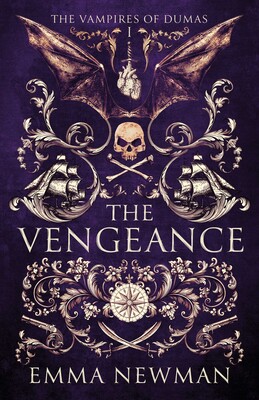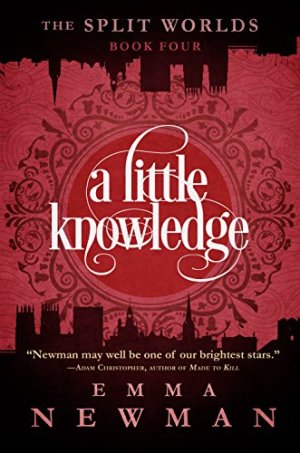Book Review: The Vengeance, by Emma Newman

The Vengeance is an enjoyable romp by Emma Newman, a flintlock fantasy about a pirate girl’s quest to find her long-lost birth mother. The publisher’s tagline calls it a “swashbuckling adventure set in a version of Alexandre Dumas’s world haunted by vampires” but there isn’t any real hint of the supernatural in the text until about two-thirds of the way through. So if you’re primarily interested in horror, or if you’re really not into pirates, this may not be the book for you. If you enjoy a feisty female protagonist getting into fish-out-of-water misadventures, plus sapphic romance, keep reading. Anna-Marie, the pirate captain who raised her, confesses on her deathbed that she had stolen Morgane from her real mother, whom she calls a monster. But Morgane finds a letter from her birth mother begging for her return and hinting at her own safety concerns. There are various other puzzlements, such as why Anna-Marie had exclusively attacked one trading company’s ships (beyond saying that the owner had ruined her life). However, since Morgane has never run into any situation she can’t handle (albeit with the backing of her fellow pirates), she decides to go and rescue her birth mother. By Chapter Five, Morgane is on her way to France. Once she gets there, she runs into trouble almost immediately; she doesn’t have any idea how many people are going to want to use her, and she knows nothing of how feudalism works. She doesn’t understand why the peasants don’t just vote out their tyrannical lords, the way a pirate crew would reject any pirate captain who wasn’t fair to them. She’s very worldly in some ways, but very naive in others. Note: Morgane tells this story (first person past tense), and she is almost entirely uncritical of the pirate code and lifestyle throughout. She’s rightly proud of how capable it’s made her, but she only feels mild regret for the deaths she’s caused after someone whose lover was killed berates her, and that’s brief. After seeing the vast inequality of wealth in France, she’s sure that trading ships just make rich people richer, so they’re legitimate targets. Anyway, Morgane eventually finds a few people who will help her navigate the treacherous tides of French society, and makes her way toward the estate where she believes her mother is being held. Things turn out very differently from how she had thought, with some shocking scenes and revelations, but with her pistols, sword, dagger, fierce will, and the power of love, Morgane achieves a happy ending. The publisher lists The Vengeance, which comes out May 6, as Book #1 of The Vampires of Dumas, but it works perfectly well as a standalone novel. There are one or two minor dangling plot threads I can think of, plus the likelihood that Morgane will encounter more supernatural and worldly threats in the future, but all the current major perils have been vanquished and the emotional arcs resolved satisfactorily by the end of this book. Content warnings: Piracy, deaths, bloody violence, long-told lies, vampires and other supernatural stuff. Comps: Scarlet, by Genevieve Cogman. Disclaimers: I received a free eARC for review from the publisher via NetGalley.
Book Review: A Little Knowledge by Emma Newman

Fourth in the Split Worlds series, and in some ways a brand new start after the original trilogy (Between Two Thorns, Any Other Name, All is Fair), A Little Knowledge by Emma Newman brings new opportunities, changes, and challenges to the characters in Newman’s urban fantasy world. Talking about those characters, their changes, and what Newman does with them is necessarily spoilery for the first three novels. This review assumes that you are all right with spoilers, or you have read the first three novels. Newman’s title “A Little Knowledge” seems to invoke the often misquoted line from a poem by Alexander Pope, “A little learning is a dangerous thing”. And that is definitely true of the three major protagonists in the novel. All of them have been raised to positions of power, with ideas of what to do with that power, but find that the actual application and use of that power for what they want and need to do is much trickier than they ever expected. Even in an urban fantasy world, there are no magic wands to wave.
Series Review: The Split Worlds by Emma Newman

19th Century social customs. Mad and dangerous Faerie, just a world away. Scheming sorcerers and elementals. And a few ordinary and not so ordinary people trapped in the middle, carving themselves out a life of their own. And, perhaps, making a difference. All is Fair completes the Split Worlds Trilogy by Emma Newman. With that book now complete, a look back at the entirety of the series is in order. Between Two Thorns starts the trilogy in fine fashion, inserting us into the lives of Catherine, Max and Sam. Catherine seeks to escape the net of the society of the fae-serving long-lived families living in Bath’s Mirror City, Aquae Sulis. Max, on behalf of the Sorcerer he works for, seeks to solve a gristly mystery that has already changed him profoundly. And Sam, unassuming, ordinary Sam taking a piss at the wrong place at the wrong time, finds that such a chance event can have lasting and unexpected consequences. Newman ably lays the ground rules of her universe, and gives us the first long glimpse into its society. Any Other Name brings the Split Worlds series to the next level. With Catherine and the man her family she has arranged her to marry, William Iris, ready to be hitched, Max’s investigations getting ever deeper, and Sam getting tangled with both Fae and an Elemental Lord, the Split Worlds widens appreciably in this second novel. The intrigues and politics of Bath seem positively domestic and small-time compared to the world of Londinium, as the stakes for all of the characters are raised. It is in this novel that all of the major characters make life-altering decisions about their future, and start taking steps to make their goals a reality. If Between Two Thorns shows the power of a powerful debut, Any Other Name shows the follow-through. William Iris in particular rises in stature to a full viewpoint character, giving us a view of a character fully born, bred, and part of Nether society. And yet even he has secrets and dreams of his own. All is Fair caps off the trilogy, and deepens the look into the Split Worlds even further. That tiny detail of Sam‘s iron ring first seen in Between Two Thorns finally is paid off, as are a number of other plotlines. William’s uncertain newly won position as Duke of Londinium is severely tested. Catherine’s position within society and her mission are clarified. Max’s investigations finally come to a head. And we learn more about Sorcerers, Elemental Courts, powerful Nether power-players, and more. In the case of all of the viewpoint characters stories, however, the end is only the beginning. Their lives come to resting points but hardly to endpoints. If anything, it is clear that while they reach stages in their lives, their lives, careers, ambitions and paths have only just begun. There is real growth, change, triumph, tragedy, and pathos to be had. Catherine is hardly the young woman seeking to escape Nether society that we find at the beginning of Between Two Thorns. So, too, Max, William and Sam have gone through a lot, and been changed by their own decisions, and the decisions of others. The magical world of the Split Worlds has been changed by all of their actions, and they changed by it, but the world, and the characters, continue onward. Larry Niven has spoken of a “Playground of the Imagination”, where one can imagine traveling through a setting or milieu after the book is closed. The best of his novels, such as the Ringworld novels, exemplify that ethos. Closing one of his books, one can invent or imagine plenty of imaginary adventures in Known Space and beyond, with the foundation and concrete detail and richness already laid down. In the Split Worlds Trilogy, Emma Newman has managed to do the same, but in terms of a social web. One can imagine, and wonder what the social web will do, after the events of All is Fair. Too, rather than wondering what planets or BDOs are out there, when I was finished with the Split Worlds, I wondered what Nether society was like in New York City. Or Melbourne. Or Cairo. Or Mumbai. Or Shanghai. The idea of networks of relationships of the Families,the Fae, the sorcerers, and the Elemental Courts all across the globe is as inspiring as any solar-system sized object. Too, the rich RPG feel of the universe dovetails with the author’s own personal interests, as an avid gamer herself. At many points in the narrative, I mused how one might run games set in the Split Worlds universe. I once likened the Split Worlds universe as “Downton Abbey meets Changeling : The Dreaming (a RPG concerned with the Fae and those wrapped around them. Certainly, roleplaying games like Hillfolk (which are all about social drama), Nobilis (with its unearthly setting put cheek-by-jowl with the modern world) and FATE (with its flexibility and adaptability to settings) would all be interesting systems to use to explore the Split Worlds universe. Many of the current crop of fantasy writers grew up playing the likes of Dungeons and Dragons, influencing their secondary world fantasy. Emma Newman’s experience with games like White Wolf’s storyteller system (Changeling, Vampire the Masquerade, etc) has clearly influenced her urban fantasy in analogous manner. The Split Worlds Trilogy marks the author as someone to watch for her future endeavors, be they within the Split Worlds or elsewhere. And were I to ever have a novel published, the dulcet voice of Emma would be high on my wish list of narrators to do the audiobook version. The audiobooks are as much a delight to listen to as the physical and e-books are to read. I intend to take the books with me on my next long driving vacation, so that I can return to the rich world that Newman has created, and share it with others.

